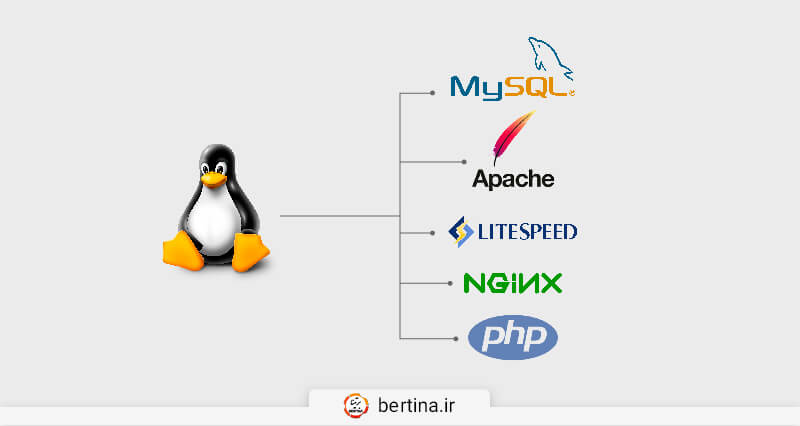Differences Between Linux and Windows Hosting
We tel this Explore the key differences between Linux and Windows hosting to make an informed choice for your website. Learn about features, performance, and security. To display your website on the web, you need a hosting service that meets the needs of your website. Therefore, you need to understand the types of hosting services to choose the best option for your website. In this article, we delve into the comparison of Linux and Windows hosting to provide you with a better understanding of these two hosting services.
What is Hosting?
Hosting, or web hosting, is a service that makes your website content accessible on the internet. Essentially, hosting refers to space on a physical server that you rent to display your website or application on the web and store all the necessary files and data for the proper functioning of your website.
Hosting services are divided into several categories based on the type of operating system, with Linux and Windows being the most popular and widely used hosting operating systems. The hosting operating system makes accessing and managing the hosting easier, and depending on the programming language of your website, you need to obtain hosting with the required operating system. In the following sections, we introduce Linux hosting, and Windows hosting, and compare Linux and Windows.
What is Linux Hosting?
In general, Linux hosting is hosting with the server operating system being Linux. Linux operating system is one of the most powerful operating systems available in the market, provided as open source. This operating system enjoys special popularity among users.
Linux is an open-source operating system, allowing many programmers to develop and meet their needs in various fields. Currently, many users use Linux as the infrastructure for their software, and each of these software programs has millions of users.
Two special advantages of the Linux operating system are its free nature and its very high security. As this operating system is open source, many people work on its security every day and patch its vulnerabilities. Therefore, given the advantages mentioned about the Linux operating system, many users choose Linux hosting.

What is Windows Hosting?
In summary, Windows hosting is hosting with the server operating system being Windows. Windows is one of the operating systems commonly used for hosting. The Windows operating system has versions that can be installed on servers.
Differences Between Linux Hosting and Windows Hosting
To find the differences between these two types of servers, it is better to examine the differences between Linux and Windows. In the following, we examine the differences between Linux hosting and Windows hosting in terms of web server, control panel, security, and speed.
Difference Between Web Servers of Linux Hosting and Windows Hosting
When you search for a domain in your browser, a series of processes are performed by the webserver to allow you to view that site. The web server is software and hardware that uses HTTP protocol and other protocols to respond to customer requests made via the web network. The main task of the web server is to display website content by storing, processing, and presenting web pages to users. In addition to HTTP, web servers also support protocols such as SMTP and FTP for email, file transfer, and storage.
Given the above explanations, it can be concluded that choosing the right web server can have a significant positive or negative effect on the performance of the website. Some of the most popular Linux web servers include Apache, Nginx, and LiteSpeed, each hosting company offers plans that use these web servers depending on the type of server configuration.
The most important issue in choosing a web server is the programming language of the website. If the website is designed with languages such as ASP or ASP.net, it can only be launched on a Windows server. However, if the website uses languages such as PHP, and Perl, or is based on popular CMS platforms like WordPress, contrary to the belief of most users, it can be loaded on both Windows and Linux servers. This entirely depends on the server configuration by the hosting company. By default, Linux server configurations are more suitable for supporting languages like PHP, Perl, and popular CMS platforms such as WordPress, and they will have better performance.
Comparison of Control Panels of Windows Hosting and Linux Hosting
Control panels like Cpanel, Plesk, and DirectAdmin are popular among Linux hosting users. Common control panels for Windows hosting include Plesk, SolidCP, and WebsitePanel. Among these control panels, only Plesk offers panels for both Linux and Windows operating systems.
Comparing control panels of Windows hosting with Linux hosting does not provide accurate information because each of these panels is designed based on the structure and features of the desired operating system, and it cannot be determined which one is superior to the other.

Is Linux Hosting Faster or Windows Hosting?
The speed of hosting is one of the most important factors for managing a website, which has a high impact on the hardware of the server and speed optimization tools. Therefore, it can be said that the operating system will not have a significant effect on the speed of hosting.
Is Linux Hosting More Secure than Windows Hosting?
Some users consider Linux hosting to be more secure than Windows hosting due to its open-source nature. From a technical point of view, this issue has not been confirmed or denied. Therefore, it cannot be definitively said which hosting is more secure. The most important issue in hosting security is establishing security by the hosting company and performing security measures by the site administrator.
Conclusion: Differences Between Linux Hosting and Windows Hosting
In this article, we examined these two hosting services in terms of web server, control panel, speed, and security. Based on the analyses conducted, we concluded that the main difference between Linux hosting and Windows hosting lies in their operating systems. Therefore, considering the needs of your website and its programming language, it is best to choose hosting that provides the best performance for your website.
